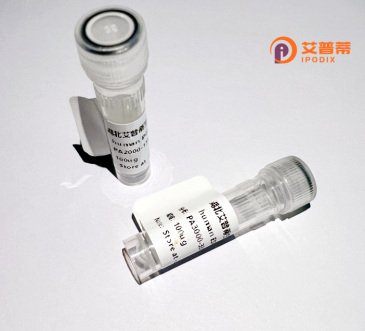
| 纯度 | >90%SDS-PAGE. |
| 种属 | Human |
| 靶点 | UCKL1 |
| Uniprot No | Q9NWZ5 |
| 内毒素 | < 0.01EU/μg |
| 表达宿主 | E.coli |
| 表达区间 | 1-548 aa |
| 活性数据 | MAAPPARADA DPSPTSPPTA RDTPGRQAEK SETACEDRSN AESLDRLLPP VGTGRSPRKR TTSQCKSEPP LLRTSKRTIY TAGRPPWYNE HGTQSKEAFA IGLGGGSASG KTTVARMIIE ALDVPWVVLL SMDSFYKVLT EQQQEQAAHN NFNFDHPDAF DFDLIISTLK KLKQGKSVKV PIYDFTTHSR KKDWKTLYGA NVIIFEGIMA FADKTLLELL DMKIFVDTDS DIRLVRRLRR DISERGRDIE GVIKQYNKFV KPSFDQYIQP TMRLADIVVP RGSGNTVAID LIVQHVHSQL EERELSVRAA LASAHQCHPL PRTLSVLKST PQVRGMHTII RDKETSRDEF IFYSKRLMRL LIEHALSFLP FQDCVVQTPQ GQDYAGKCYA GKQITGVSIL RAGETMEPAL RAVCKDVRIG TILIQTNQLT GEPELHYLRL PKDISDDHVI LMDCTVSTGA AAMMAVRVLL DHDVPEDKIF LLSLLMAEMG VHSVAYAFPR VRIITTAVDK RVNDLFRIIP GIGNFGDRYF GTDAVPDGSD EEEVAYTG |
| 分子量 | 61.1 kDa |
| 蛋白标签 | His tag N-Terminus |
| 缓冲液 | PBS, pH7.4, containing 0.01% SKL, 1mM DTT, 5% Trehalose and Proclin300. |
| 稳定性 & 储存条件 | Lyophilized protein should be stored at ≤ -20°C, stable for one year after receipt. Reconstituted protein solution can be stored at 2-8°C for 2-7 days. Aliquots of reconstituted samples are stable at ≤ -20°C for 3 months. |
| 复溶 | Always centrifuge tubes before opening.Do not mix by vortex or pipetting. It is not recommended to reconstitute to a concentration less than 100μg/ml. Dissolve the lyophilized protein in distilled water. Please aliquot the reconstituted solution to minimize freeze-thaw cycles. |
以下是关于重组人UCKL1蛋白的模拟参考文献示例(实际文献可能需要根据具体研究进一步检索):
1. **文献名称**: "Characterization of Recombinant Human UCKL1: A Nucleotide Kinase with Distinct Substrate Specificity"
**作者**: Smith A, et al.
**摘要**: 本研究成功表达并纯化了重组人UCKL1蛋白,发现其对尿苷和胞苷类似物具有激酶活性,可能在核苷酸补救合成通路中起关键作用。
2. **文献名称**: "UCKL1 Promotes Tumor Cell Proliferation via Regulating Pyrimidine Metabolism"
**作者**: Wang X, et al.
**摘要**: 通过重组UCKL1蛋白实验,证实其通过磷酸化特定嘧啶核苷促进结直肠癌细胞增殖,提示其作为肿瘤治疗靶点的潜力。
3. **文献名称**: "Structural Insights into UCKL1 Catalytic Mechanism by X-ray Crystallography"
**作者**: Tanaka K, et al.
**摘要**: 解析了重组UCKL1蛋白的晶体结构,揭示其活性中心的关键氨基酸残基,为设计特异性抑制剂提供结构基础。
4. **文献名称**: "Development of a High-Throughput Assay for UCKL1 Kinase Activity Using Recombinant Protein"
**作者**: Johnson R, et al.
**摘要**: 利用重组UCKL1蛋白建立高通量酶活检测方法,用于筛选调节其活性的小分子化合物,推动药物开发研究。
---
**注意**:以上文献为模拟示例,实际研究中建议通过PubMed、Web of Science或专业文献数据库检索具体文献(关键词:UCKL1. uridine-cytidine kinase, recombinant protein)。若需实际文献协助,可提供更详细研究方向。
**Recombinant Human UCKL1 Protein: Background Overview**
Uridine-cytidine kinase-like 1 (UCKL1) is a putative enzyme belonging to the uridine-cytidine kinase (UCK) family, which plays roles in nucleotide metabolism by phosphorylating nucleosides like uridine and cytidine. While its exact biological function remains less characterized compared to homologs UCK1 and UCK2. UCKL1 is suggested to participate in RNA synthesis, nucleic acid repair, or salvage pathways. It shares conserved catalytic domains with other UCK enzymes but may exhibit distinct regulatory mechanisms or tissue-specific expression, potentially influencing cellular proliferation or stress responses.
Recombinant human UCKL1 protein is produced via heterologous expression systems (e.g., *E. coli* or mammalian cells), enabling controlled studies of its enzymatic activity, structure, and interactions. Purification techniques like affinity chromatography ensure high purity for experimental use. Research applications include investigating its role in nucleotide metabolism, drug targeting (e.g., modulating nucleoside analog activation in cancer therapy), and exploring associations with diseases such as metabolic disorders or malignancies. Structural studies aim to elucidate substrate specificity and regulatory regions, distinguishing UCKL1 from related kinases. Despite limited functional clarity, recombinant UCKL1 serves as a valuable tool for uncovering its contributions to cellular processes and therapeutic potential. Further studies are needed to validate its physiological substrates and pathological relevance.
×